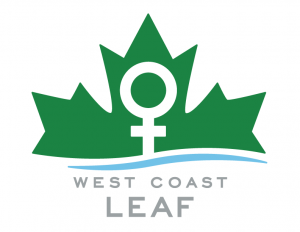This post introduces a newly added resource in the Reform & Research section of Clicklaw, the public window to legal reform and innovations in BC.
By Kendra Milne
Director of Law Reform, West Coast LEAF
After an election campaign in which women’s equality became a rhetorical tool in a divisive attempt to instill fear and xenophobia in voters and control women’s religious choices, Canada has opted for a more hopeful federal government. But where does that leave women in BC?
We know the primary causes of women’s inequality: disproportionate financial insecurity due to unpaid caregiving and wage inequity, and violence, which undermines a woman’s ability to exercise her most basic rights. These are some of the fundamental drivers of women’s well-being and security, in addition to the ability to access assistance to enforce their legal rights. Many of the solutions to these issues fall totally or partially under the responsibility of provincial governments.
With that in mind, West Coast LEAF has released its seventh annual report card on women’s rights in BC. The report card assesses how well the BC government is complying with the obligations set out in the UN Convention on the Elimination of All Forms of Discrimination against Women (CEDAW). CEDAW, often described as an international bill of rights for women, was ratified by Canada in 1981. The focus of the report card is the provincial government, but it provides a useful framework to measure the potential impact of some of the platform promises of Canada’s new federal government. Below are some of the Liberal Party of Canada’s (LPC) campaign promises in areas particularly relevant to women’s equality and some key findings about the BC provincial government’s role and progress in those areas from this year’s CEDAW report card.
Poverty
The LPC platform included a new federal Canada Child Benefit that will provide monthly financial support for families with children. While this new benefit will increase the incomes of many families, it does little to address the chronic underfunding of provincial social assistance in BC, which undermines BC’s CEDAW commitments. Social assistance rates have remained stagnant since 2007 despite increases to the cost of living, forcing families on assistance into ongoing financial crisis, and BC continues to refuse to commit to a legislated poverty reduction plan.
Childcare
The LPC also committed to meet with provinces, territories, and Indigenous communities to begin work on a new National Early Learning and Child Care Framework, noting that any policy in this area must be developed in a way that respects provincial jurisdiction.
The requirement for cooperation from provinces doesn’t bode well for women in BC if the last year is any indication—BC made very minor progress, but for the most part, the provincial government has failed to improve affordability, quantity and quality of childcare. Despite CEDAW requirements, women in BC continue to pay most of the consequences when families cannot access childcare, including reduced or precarious labour force participation that undermines their financial independence.
Employment
The LPC platform included a promise to improve flexibility for employees in federally regulated jobs. While increased job flexibility may assist women balancing unpaid caregiving and employment, it helps only a fraction of employees; the vast majority work in provincially regulated jobs so federal changes will not affect them. Employment equity in BC is largely stagnant with women still earning significantly less and working more precarious part-time jobs than men despite making up nearly half of the labour force.
Missing and Murdered Indigenous Women and Girls
The LPC committed to a national public inquiry into missing and murdered Indigenous women and girls across Canada, a positive and necessary commitment. However, we cannot forget that provincial governments will likely be responsible for implementing many recommendations that flow from any inquiry, particularly in the areas of poverty, housing, support for families and children, and access to justice.
This past year, the BC government failed to take action in response to numerous existing international and domestic recommendations to improve safety for Indigenous girls and women. Instead of finding solutions, government staff intentionally deleted emails related to the issue to avoid disclosing them, reflecting a total disregard for CEDAW obligations.
Access to Justice
The LPC platform did not contain any federal commitments respecting legal aid, leaving the matter totally up to provincial governments. Once again, this doesn’t bode well for women in BC given that there is inadequate or no coverage for the legal services most important to women, another example of BC’s failure to meet its CEDAW obligations.
CEDAW requires both federal and provincial governments to take steps to eliminate discrimination against women. The new federal government, if it delivers on its campaign promises, will make improvements in some policy areas that will benefit women, but much of the work still falls on the provincial government.
However, BC continues to fail to deliver on many of its responsibilities under CEDAW. In particular, BC has not taken meaningful steps to address the ongoing violence against Indigenous women and girls, the basic human rights of many incarcerated women and girls are overlooked, many women do not have access to secure housing, women continue to be less economically secure than men, and women remain unable to enforce their legal rights because of inadequate legal aid.
Despite potential improvements at the federal level, real progress for women in BC will remain at a standstill unless the provincial government takes meaningful action.
Stay informed:
West Coast LEAF’s mission is to achieve equality by changing historic patterns of discrimination against women through BC-based equality rights litigation, law reform, and public legal education. The author, Kendra Milne, is Director of Law Reform at West Coast LEAF. A version of this post was originally published on PolicyNote.ca, a project of the Canadian Centre for Policy Alternatives-BC office.

